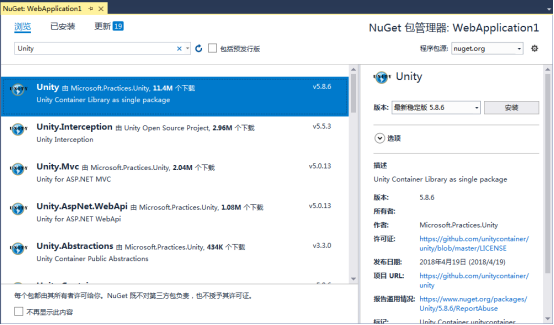為什麼有這篇文章 最近在學ASP.NET MVC項目中使用Ioc,選用了Unity作為依賴註入的容器組件,在網上找了相關的文章簡單實現了依賴註入,但想用文件配置的方式進行容器註入的註冊,發現相關的文章實現的方式不適用,因為網上的文章大多是使用Unity 4.0.1的版本,而目前最新的Unity版本是 ...
為什麼有這篇文章
最近在學ASP.NET MVC項目中使用Ioc,選用了Unity作為依賴註入的容器組件,在網上找了相關的文章簡單實現了依賴註入,但想用文件配置的方式進行容器註入的註冊,發現相關的文章實現的方式不適用,因為網上的文章大多是使用Unity 4.0.1的版本,而目前最新的Unity版本是5.8.6,使用配置進行容器註入的代碼已然不同。
Ioc和Unity
IOC(Inversion of Control),即“控制反轉”,是一種設計思想。有了IoC後,把創建和查找依賴對象的控制權交給了容器,由容器進行註入組合對象,所以對象與對象之間是鬆散耦合,這樣也方便測試,利於功能復用,更重要的是使得程式的整個體繫結構變得非常靈活。
Unity是微軟Patterns & Practices 部門開發的一個輕量級的依賴註入容器。
代碼準備
新建一個MVC項目,使用預設命名WebApplication1。在Model中新建下麵3個類:
public class User { public int Id { get; set; } public string UserName { get; set; } public string Password { get; set; } public string Email { get; set; } }
public interface IUserDao { List<User> GetAllUsers(); }
public class EFUserDao : IUserDao { public List<User> GetAllUsers() { List<User> list = new List<User>(); //使用EF從資料庫中讀取數據... return list; } }
HomeController中的Index()中編寫代碼:
using WebApplication1.Models; public class HomeController : Controller { public ActionResult Index() { IUserDao dao = new EFUserDao(); var list = dao.GetAllUsers(); //do something... return View(); } }
以上代碼主要實現從資料庫中獲取用戶列表數據到控制器中。
使用Unity
在項目引用上右擊,管理Nuget程式包,搜索到Unity並安裝。

HomeController中代碼改動
using WebApplication1.Models; using Unity; public class HomeController : Controller { public ActionResult Index() { IUnityContainer container = new UnityContainer(); container.RegisterType<IUserDao, EFUserDao>(); var dao = container.Resolve<IUserDao>(); var list = dao.GetAllUsers(); //do something... return View(); } }
上面代碼先聲明一個Unity的容器,然後註冊所需要的對象,最後調用。
按上面的方式,每次使用GetAllUsers()前都需要聲明下,這裡應該封裝下。Unity在ASP.NET MVC中的使用已經將代碼封裝好了。
ASP.NET MVC使用Unity
使用Nuget安裝Unity.MVC。

安裝完成後會在~/App_Start/目錄下自動生成UnityMvcActivator.cs和UnityConfig.cs文件。
打開UnityConfig文件,修改RegisterTypes()方法的代碼
public static void RegisterTypes(IUnityContainer container) { // NOTE: To load from web.config uncomment the line below. // Make sure to add a Unity.Configuration to the using statements. // container.LoadConfiguration(); // TODO: Register your type's mappings here. container.RegisterType<IUserDao, EFUserDao>(); }
註意引用
using WebApplication1.Models;
修改HomeController代碼(使用構造函數註入)
public class HomeController : Controller { IUserDao _iUserDao; public HomeController(IUserDao iUserDao) { this._iUserDao = iUserDao; } public ActionResult Index() { var list = _iUserDao.GetAllUsers(); //do something... return View(); } }
此方式是將依賴註入寫在了代碼中。然而並不靈活,每添加一組類,都要在UnityConfig中進行註冊並編譯一遍代碼。我們更需要的是在配置文件中註冊類型。
使用配置文件
修改UnityConfig文件中RegisterTypes()方法的代碼:
public static void RegisterTypes(IUnityContainer container) { // NOTE: To load from web.config uncomment the line below. // Make sure to add a Unity.Configuration to the using statements. container.LoadConfiguration(); // TODO: Register your type's mappings here. // container.RegisterType<IUserDao, EFUserDao>(); }
需要引用
using Microsoft.Practices.Unity.Configuration;
更改Web.Config的配置:
<?xml version="1.0" encoding="utf-8"?> <configuration> <configSections> <section name="unity" type="Microsoft.Practices.Unity.Configuration.UnityConfigurationSection, Unity.Configuration"/> </configSections> <unity> <containers> <container> <types> <type type="WebApplication1.Models.IUserDao, WebApplication1" mapTo="WebApplication1.Models.EFUserDao, WebApplication1" /> </types> </container> </containers> </unity> ...... </configuration>
運行站點,成功獲取用戶列表數據。
擴展
如果需求更改,要換用ADO.NET來操作資料庫,只要建一個SQLUserDao的類,繼承自IUserDao,然後將配置文件中的註冊類型修改即可
<type type="WebApplication1.Models.IUserDao, WebApplication1" mapTo="WebApplication1.Models.SQLUserDao, WebApplication1" />
筆者使用的是VS2017進行操作。


